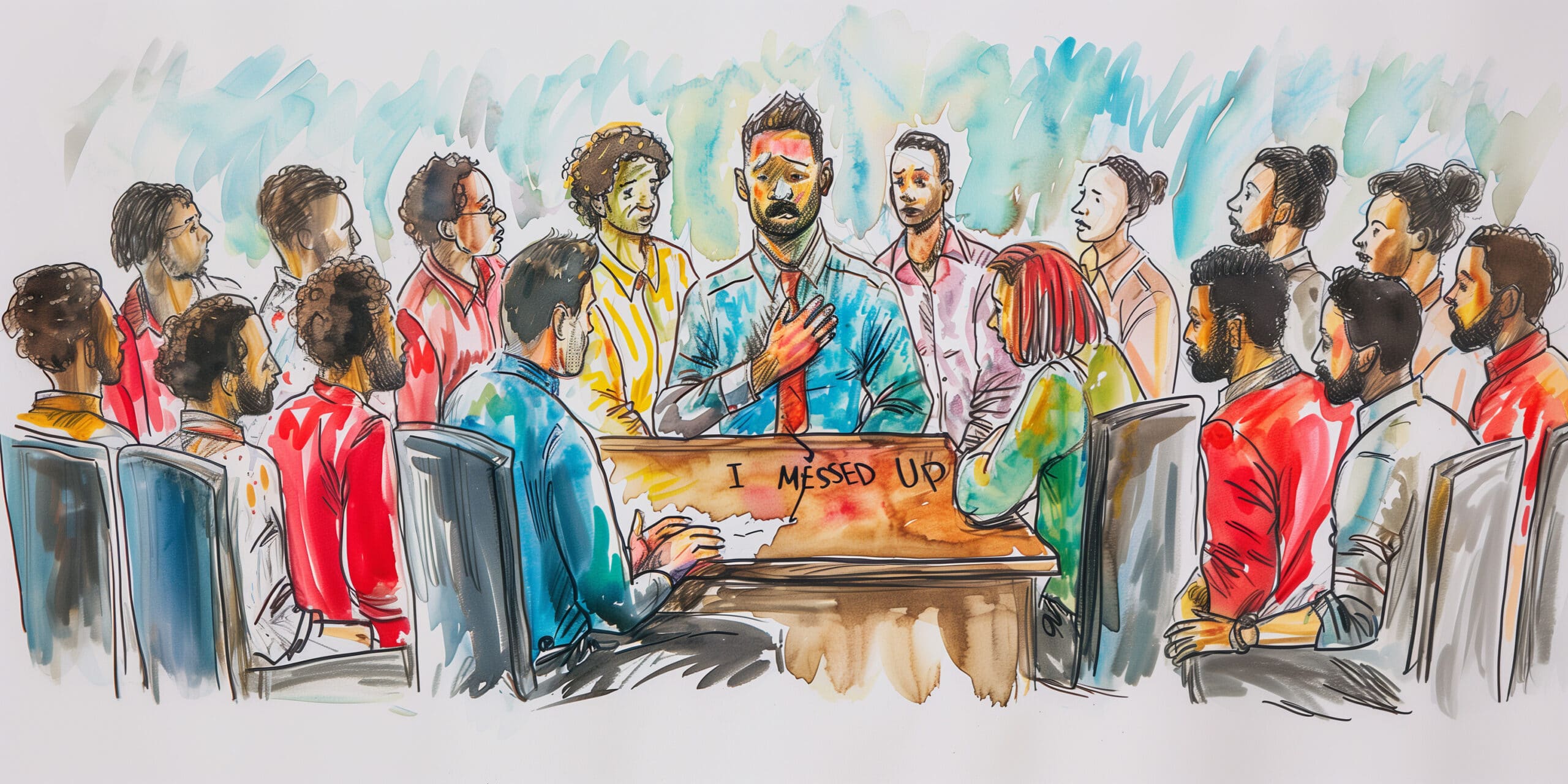“Staying vulnerable is a risk we have to take if we want to experience connection.” – Brene’ Brown
In the nuanced game of managing people, the role of accountability cannot be overstated. When we have lack of accountability in an organization, what I call a Culture Cancer invades the organization’s compromised immune system – spreading from wherever it finds an entry point, seeking to undermine management from the top down and back up again. Brene Brown, in her transformative work Daring Greatly, underscores the courage inherent in practicing vulnerability in order to achieve human connection. When we seek to give others feedback in a way that lands and achieves our goals, connection is the foundation. Counterintuitively, it’s the vulnerability that a manager needs when practicing accountability that feels scary or even impossible. Here, I explore the psychological barriers to accountability and offer strategies to overcome them, transforming the way we lead.
The Human Side of Accountability
 Many managers struggle with accountability due to personal experiences and the complexities of human relationships. For instance, a manager who has risen from the ranks may find it challenging to hold former peers accountable. In cases where the employee is older, more experienced, or even a friend, enforcing standards can feel like navigating a minefield of emotions and loyalties.
Many managers struggle with accountability due to personal experiences and the complexities of human relationships. For instance, a manager who has risen from the ranks may find it challenging to hold former peers accountable. In cases where the employee is older, more experienced, or even a friend, enforcing standards can feel like navigating a minefield of emotions and loyalties.
Brene Brown aptly puts it, “Daring leaders work to make sure people can be themselves and feel a sense of belonging.” But some people misinterpret her teachings to require that managers make everyone feel comfy-cozy all day long with no one to say “You aren’t getting it right” on the horizon. The price of a sense of belonging, however, is not lack of accountability. Quite the opposite. Vulnerability means sharing our flaws and mistakes openly. It actually opens the door for accountability. So, how do we walk through that door? It’s about striking a balance – creating an environment where team members feel valued but also understand the importance of meeting expectations.
Elevate your leadership by transforming accountability & vulnerability into strength.
Discover how PointerWise’s Executive Coaching can help you reach your goals!
Psychological Barriers to Accountability
 The human mind is a landscape of various experiences and emotions that shape our responses to leadership challenges. When it comes to accountability, several psychological barriers can impede a manager’s effectiveness. Understanding these barriers is crucial for any leader, as they often operate subconsciously, influencing decision-making and interactions with team members. Here are a few common sources of our challenges to practicing accountability as people managers:
The human mind is a landscape of various experiences and emotions that shape our responses to leadership challenges. When it comes to accountability, several psychological barriers can impede a manager’s effectiveness. Understanding these barriers is crucial for any leader, as they often operate subconsciously, influencing decision-making and interactions with team members. Here are a few common sources of our challenges to practicing accountability as people managers:
- Fear of Conflict: Many of us shy away from potentially confrontational situations due to past negative experiences with conflict.
- Desire to be Liked: The need for approval can hinder a manager’s ability to enforce rules and standards.
- Imposter Syndrome: Doubts about one’s own capabilities can lead to hesitation in holding others accountable.
Strategies for Effective Accountability
Implementing accountability for a team and each team member requires more than just setting rules and expectations; it involves a deeper understanding of oneself as a leader and a compassionate approach toward team members. It also means encouraging and eventually requiring team members to hold each other accountable rather than going through the boss. This is essential to team trust.
Here, I review some actionable strategies that can help managers navigate the scary landscape of enforcing accountability. These strategies are designed to address the common psychological barriers and interpersonal dynamics that often make this practice challenging.
Transform your workplace with a culture of accountability and growth.
Explore our services today.

- Start with Self-Reflection: Understand your own barriers to accountability. Are they rooted in fear of conflict, a need for approval, or self-doubt? Acknowledging these feelings is the first step towards overcoming them.
- Develop Emotional Intelligence: Work on understanding and managing your emotions and recognizing and influencing the emotions of others.
- Foster Open Communication: Create an environment where feedback is normalized. This step harkens to Patrick Lencioni’s The Five Dysfunctions of a Team and the need for any productive team to engage in healthy conflict or ideological debate. Regular, honest conversations can demystify accountability and make it part of the team culture. Vulnerability is key here, and a team philosophy that screwing up or having a bad day doesn’t make you a bad person or a failure, and that failure is just a sign we are practicing, growing, and getting better at what we do together. Easier said than done, but many teams do this and find themselves enjoying their work together and producing amazing results!
 Set Clear Boundaries: This is especially important when managing friends or former peers. Clear boundaries help in separating personal and professional relationships. You may find that whatever socializing you were doing with people who report to you now in the past needs to fade into a past chapter of your life. This can be an unpopular view. All I can say is I learned the hard way and if, like me, you don’t take the advice, you’ll learn too. And that’s OK. Which leads us back to the next tip…
Set Clear Boundaries: This is especially important when managing friends or former peers. Clear boundaries help in separating personal and professional relationships. You may find that whatever socializing you were doing with people who report to you now in the past needs to fade into a past chapter of your life. This can be an unpopular view. All I can say is I learned the hard way and if, like me, you don’t take the advice, you’ll learn too. And that’s OK. Which leads us back to the next tip…- Embrace Vulnerability: As Brene Brown suggests, vulnerability is a strength. Being open about your mistakes, fears, weaknesses, challenges, and expectations can foster a deeper connection and understanding within the team.
- Seek Mentorship or Coaching: Learning from experienced leaders or coaches can provide valuable insights into handling challenging management situations effectively.
 The journey out of your comfort zone will, if you are a rising star, become more and more common in your professional life. It will never feel comfortable. But if you’re paying attention, you’ll know that uncomfortable feeling means an opportunity for growth. Practicing accountability is nuanced and deeply personal. It requires managers to confront their own fears and vulnerabilities, to embrace the uncomfortable, and to recognize that in the terrain of leadership, courage and accountability are intertwined. By developing emotional intelligence, setting clear boundaries, and fostering open communication, managers can cultivate a practice of accountability that resonates with respect, empathy, and growth and sets an example for their entire organizations.
The journey out of your comfort zone will, if you are a rising star, become more and more common in your professional life. It will never feel comfortable. But if you’re paying attention, you’ll know that uncomfortable feeling means an opportunity for growth. Practicing accountability is nuanced and deeply personal. It requires managers to confront their own fears and vulnerabilities, to embrace the uncomfortable, and to recognize that in the terrain of leadership, courage and accountability are intertwined. By developing emotional intelligence, setting clear boundaries, and fostering open communication, managers can cultivate a practice of accountability that resonates with respect, empathy, and growth and sets an example for their entire organizations.
Reflective Questions:
- How do your personal experiences and relationships influence your approach to accountability?
- In what ways can you incorporate vulnerability into your leadership style to enhance accountability?
- How can you balance the need for accountability with maintaining positive relationships within your team?
“I haven’t got the slightest idea how to change people, but still I keep a long list of prospective candidates just in case I should ever figure it out.”
– David Sedaris
Did this article help? We have tons more wisdom we would like to share.
Reach out to the PointerWise Team today.






